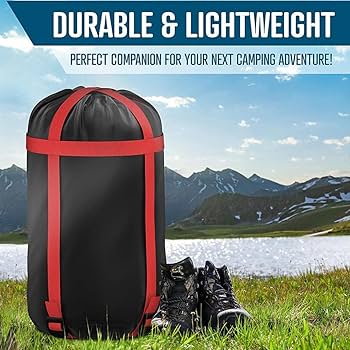When looking for sleeping bags for hiking, consider the temperature rating and weight. Choose a lightweight, packable sleeping bag suitable for the expected weather conditions on your hiking trip.
A good sleeping bag is essential for hikers, providing a comfortable rest after a long day on the trail. When selecting a sleeping bag, it’s crucial to consider factors like weight, warmth, compressibility, and overall comfort.
Hiking sleeping bags are designed to be lightweight and packable, ensuring they can easily fit in a backpack while still providing adequate insulation. Their temperature rating is also important, ensuring that the bag can keep you warm in the expected weather conditions. The material’s durability and water resistance are also vital for outdoor adventures. With various options available, choosing the right sleeping bag will enhance your hiking experience and contribute to a restful night’s sleep in the great outdoors.
Choosing The Right Sleeping Bag
When planning a hiking trip, one of the most crucial decisions you’ll make is choosing the right sleeping bag. The right sleeping bag provides comfort and ensures a good night’s sleep, ready for the next day’s adventures. With a myriad of options available in the market, knowing the key factors can help you make an informed choice.
Factors To Consider
Before purchasing a sleeping bag for your hiking trip, it’s essential to consider a few key factors:
- Temperature Ratings
- Weight and Packability
- Insulation Type
- Size and Fit
- Price and Budget
Temperature Ratings
Understanding temperature ratings is crucial for selecting the right sleeping bag. Temperature ratings indicate the lowest temperature at which a bag will keep the average sleeper warm. It’s important to choose a bag rated for temperatures lower than you expect to encounter on your hiking trips to ensure comfort and safety.
Weight And Packability
Weight and packability are essential considerations for hikers, as every ounce matters. Look for a sleeping bag that balances warmth and weight while compressing enough to fit your backpack without taking up too much space.
Different Types Of Sleeping Bags
Sleeping bags for hiking come in various types, such as lightweight mummy bags for colder temperatures, rectangular bags for more room, and ultralight options for easy portability. Whether you’re looking for a cozy bag for summer camping or a heavy-duty winter sleeping bag, plenty of options are available for every hiker’s needs.
Mummy Sleeping Bags
A mummy sleeping bag is designed to fit snugly around the body, providing excellent warmth retention. These bags are narrow at the feet and wider at the shoulders, reducing unnecessary space that needs to be heated. They are typically lightweight, making them ideal for backpacking and hiking trips. The mummy design helps to minimize the amount of air inside the bag, which improves overall insulation.
Rectangular Sleeping Bags
Rectangular sleeping bags are spacious and allow for more freedom of movement. They are popular for camping and recreational outdoor activities where weight is not a primary concern. The rectangular shape makes them versatile and comfortable, and they can often be fully unzipped to act as a large blanket. These bags are great for those who prefer a more relaxed fit and don’t want to feel confined during sleep.
Ultralight Sleeping Bags
Ultralight sleeping bags are designed for minimal weight and maximum portability. These bags are excellent for hikers and backpackers looking to reduce pack weight without sacrificing warmth and comfort. They are constructed using lightweight materials and innovative designs to provide warmth and insulation while keeping the overall weight to a minimum. Ultralight sleeping bags are ideal for those prioritizing mobility and efficiency during outdoor adventures.
Top Sleeping Bags For Hiking
When it comes to hiking, a good night’s sleep is essential to recharge and prepare for the next day’s adventure. Choosing the right sleeping bag can make all the difference in ensuring a comfortable and restful sleep while on the trails. Here are some top sleeping bags for hiking that you should consider:
Stealth Angel Survival Orange
The Stealth Angel Survival Orange sleeping bag is ultra-lightweight and portable, making it perfect for hikers who prioritize mobility. With a price tag of $29.95, it offers great value for its quality and features. It is designed to keep you warm in temperatures as low as 20°F, ensuring a cozy night’s sleep even in chilly conditions.
The North Face Rectangular
The North Face Rectangular sleeping bag is another excellent option for hiking enthusiasts. It is currently on sale for $99.95, down from its original price of $140. This 20°F rectangular sleeping bag provides ample room to move and stretch, allowing for a comfortable sleeping experience. Its high-quality construction and insulation ensure warmth and durability, making it a reliable choice for outdoor adventures.
Rei Mummy
The REI Mummy sleeping bag is a top pick for those looking for a snug fit and maximum warmth. With a temperature rating of 5°F, it is designed to keep you cozy in cold weather conditions. Available for $129.00, the REI Mummy sleeping bag is worth the investment for hikers who venture into colder climates.
L.l.bean
If you’re seeking a versatile and reasonably priced sleeping bag, look no further than L.L.Bean. Their 40°F sleeping bag is on the market for $25.95, providing an excellent option for hikers seeking a lightweight and affordable choice. L.L.Bean is known for its quality outdoor gear, and this sleeping bag is no exception – it will keep you comfortable during your hiking trips.
Sea To Summit Spark Ultralight
The Sea to Summit Spark Ultralight sleeping bag is a top choice for ultralight backpackers who prioritize weight-saving gear. It weighs just $215.40 and compresses incredibly small, taking up minimal space in your backpack. Despite its lightweight design, it still provides reliable warmth, making it a popular option among hikers who are always on the move.

Credit: gearjunkie.com
Tips For Packing And Carrying Sleeping Bags
Sleeping bags are an essential item to pack when going hiking. Proper packing and carrying techniques can make a significant difference in the comfort and convenience of your hiking experience. Here are some useful tips on efficiently packing and carrying your sleeping bag.
Placement In Hiking Backpack
When it comes to packing your hiking backpack, the placement of your sleeping bag is crucial. It’s best to put your sleeping bag in the bottom compartment of your backpack. This will help distribute the weight evenly and provide a stable base for your other gear.
Compression And Storage
Compression is key to maximizing space in your backpack. Use compression or stuff sacks to condense your sleeping bag to save space. These sacks allow you to squeeze out excess air, reducing the overall volume. It’s important to note that over-compression can damage the insulation of your sleeping bag, so be mindful of the compression level.
Maintaining Dryness
Keeping your sleeping bag dry is crucial, especially during wet hiking conditions. Consider using a waterproof stuff sack or a backpack rain cover to keep your sleeping bag dry. These will provide an extra layer of protection against moisture and keep your sleeping bag insulated.
Additionally, using a groundsheet or tarp underneath your tent can prevent moisture from seeping into your sleeping bag from the ground. Properly ventilating your tent can also help reduce condensation, leading to a damp sleeping bag.
Faqs About Sleeping Bags For Hiking
If you’re planning a hiking trip, having the right sleeping bag is essential for a comfortable night’s rest. In this section, we’ll answer some frequently asked questions about sleeping bags for hiking. Read on to learn more!
How Heavy Should A Hiking Sleeping Bag Be?
A key consideration when choosing a hiking sleeping bag is its weight. The weight of a sleeping bag can vary depending on its temperature rating, insulation type, and fill power. As a general guideline, lightweight and ultralight sleeping bags are preferred for hiking, as they won’t add unnecessary weight to your backpack. Most lightweight hiking sleeping bags weigh between 1 and 3.5 pounds, depending on the abovementioned factors.
Where Should You Pack Your Sleeping Bag When Hiking?
When it comes to packing your sleeping bag for a hiking trip, it’s important to choose the right location within your backpack. Ideally, you should place your sleeping bag at the bottom of your pack, which will help distribute the weight evenly and provide stability. Additionally, consider using a waterproof stuff sack to protect your sleeping bag from moisture and ensure it stays dry throughout your hike.
What Are The Best Sleeping Bags For Hiking?
There are several great options for choosing a sleeping bag for hiking. Below are some top picks:
| Sleeping Bag | Temperature Rating | Weight | Price |
|---|---|---|---|
| Stealth Angel Survival Orange | 20°F | Ultra Lightweight | $29.95 |
| The North Face Rectangular | 20°F | Regular | $99.95 |
| Teton Sports Mummy | 5°F | Medium | $129.00 |
| REI Rectangular | 40°F | Regular | $25.95 |
These are just a few examples of high-quality sleeping bags suitable for hiking. Consider your specific needs regarding temperature rating, weight, and budget to find the best sleeping bag for your hiking adventure.

Credit: slumberjack.com

Credit: www.amazon.com
Frequently Asked Questions For Sleeping Bags For Hiking
What Kind Of Sleeping Bag Are Best For Hiking?
The best sleeping bags for hiking are lightweight, compact, and insulated to keep you warm. Look for a mummy-style bag for its efficiency and warmth retention. Consider the temperature rating and materials for durability. Check the weight and pack size for easy carrying on the trail.
How Heavy Should A Hiking Sleeping Bag Be?
A hiking sleeping bag should ideally weigh 2-4 pounds, balancing warmth and comfort. Keep in mind that lighter bags may sacrifice insulation. Choose based on the climate and your personal comfort level.
Where Do You Put Your Sleeping Bag When Hiking?
When hiking, put your sleeping bag in your backpack to carry it.
What Do Hikers Sleep On?
Hikers sleep on sleeping bags, which are lightweight and portable. Sleeping bags are essential for outdoor camping and hiking trips.
Conclusion
Choosing the right sleeping bag for your hiking adventures is crucial. Not only should it be lightweight and portable, but it should also provide warmth and comfort in various weather conditions. It can be overwhelming with options like mummy or rectangular bags and temperature ratings to consider.
However, considering weight, insulation, and durability, you can find the perfect sleeping bag. So, be sure to prioritize these factors when making your decision. Happy hiking!

